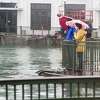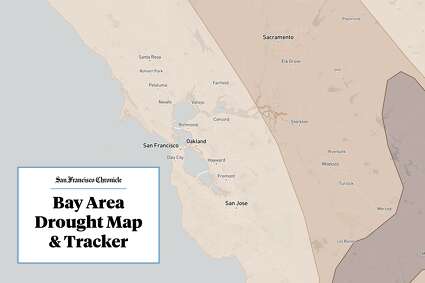This is a carousel. Use Next and Previous buttons to navigate
The annual Up Your Alley leather and fetish fair is expected to go on this weekend in San Francisco’s SoMa area, despite widespread concerns about the spread of monkeypox and the city’s decision todeclare a state of emergency.
Despite attempts on the part of the city and the fair’s organizers to quell concerns, some members of the city’s LGBTQ community say they’re concerned about the potential for the weekend’s festivities — which include the street fair on Sunday along Dore Street and other parties — to be superspreader events for monkeypox.
“I’m a hypochondriac so I will always be adamant about protecting my health and well-being,” said San Jose resident Steven Ferdin, 31, who has attended Dore Alley in the past but plans to skip this year’s event. “My perspective is that there there’s always the future, when things calm down.”
The fair — the centerpiece of the weekend expected to bring thousands of people to the alley between Howard and Folsom streets for a day of kink demonstrations, dancing and shopping — is organized by Folsom Street, which also produces Folsom Street Fair.
11 a.m.-6 p.m. Sunday. Free but donations accepted. Dore Alley, S.F.folsomstreet.org/up-your-alley-2022
“The same population that’s being most affected by the disease is the same population that attends these events, most exclusively,” said San Francisco resident David Harris, 29, who just completed a 10-day quarantine after experiencing what he initially thought were monkeypox symptoms but were not. “I just don’t even want to be here this weekend ... and having a lot of friends I can’t see for a long time” after.
Harris, who identifies as bisexual, says his biggest gripe has been the silence on the organizers to address the “elephant in the room.” Like others wary about therising case counts和缺乏疫苗用于猴痘,he too, won’t be attending Up Your Alley this year.
“I’ve been scanning their posts,” he said, referring to the Folsom Street’s website and social media. “They have yet to say a single word even mentioning the word ‘monkeypox.’ ... It just feels utterly irresponsible.”
Folsom Street Executive Director Angel Adeyoha said the organization was already taking “strong precautions” before the emergency announcement to keep festivalgoers safe and has been working with the San Francisco Department of Public Health to provide on-site outreach during the fair.
“It’s important to remember that not all viruses and infections are the same and they don’t all have the same impacts,” Adeyoha said. “Therefore all interventions don’t need to look the same. ... We are trying to keep our reactions (to monkeypox) proportional and in balance, and constantly balancing two conflicting needs.”
Those needs, Adeyoha said, are physical health and emotional wellness — which have been a challenge, not just during the isolation of the pandemic but also during the AIDS crisis. The Folsom Street kink festivals were founded during the AIDS crisis, and 2020 was the first time in 37 years that the organization made the decision to cancel its events — because of the coronavirus pandemic.
In addition to the presence of public health officials on-site to provide information about monkeypox — and who will also be offering COVID-19 boosters — the fair will include about “half the content” than that of 2019 to allow for reduced crowding.
For the second year in a row, the fair will not include spaces to purchase alcohol and will require participants to be fully vaccinated against COVID-19, Adeyoha said.
San Francisco health department officials said in a statement that the emergency was not declared in relation to this weekend’s events and that the city’s rich tradition of “social and cultural activities,” which include street fairs, nightlife and the celebrations of the LGBTQ community, are an integral part of the city.
“Monkeypox is not confined to those activities and communities and cannot be contained simply by telling people not to participate in those activities,” agency spokespeople wrote. “And those activities and the communities that host and participate in them must not be stigmatized.”
District Six Supervisor Matt Dorsey, whose area includes SoMa and who is the only openly HIV-positive member of the Board of Supervisors, said he thought the decision to move forward with the events was “true to the San Francisco model of care” developed during the AIDS crisis, which emphasizes a close collaboration with community organizations and services.
Dorsey noted the missed opportunity on the part of San Francisco city officials in the 1980s, who decided to shut down dozens of gay bathhouses thought to be superspreader venues, instead of treating them as places of outreach where people could get information about HIV.
“There is nothing prohibitive in the public health order that argues to cancel Dore Alley, and I think doing so would deny the community the benefit of a community-based partner,” Dorsey said. “Right now I’m following” the advice of Dr. Susan Philip, San Francisco’s health officer.
Whether Dore Alley will be a superspreader event was hard to predict for UCSF Professor of Medicine John Davis, who identifies as gay, but he said that, as a matter of public health, approaches that ban or stigmatize a group of people from gathering tend to backfire.
“What we’ve learned is that does not stop sexual activity,” Davis said. “The spread has been happening, and we have not had Dore Alley.”
Annie Vainshtein (she/her) is a San Francisco Chronicle staff writer. Email:avainshtein@sfchronicle.comTwitter:@annievain


















